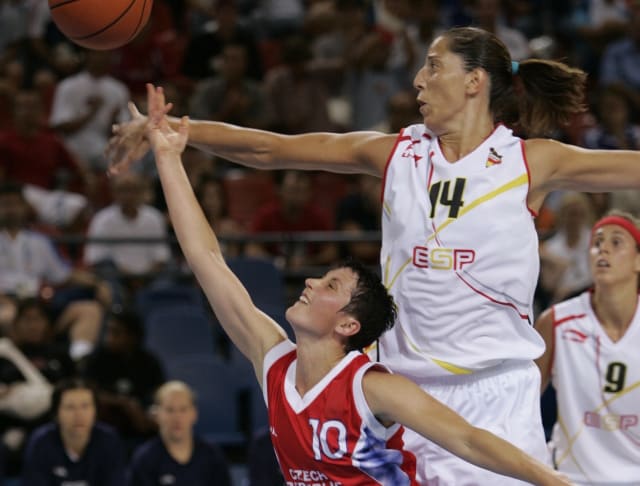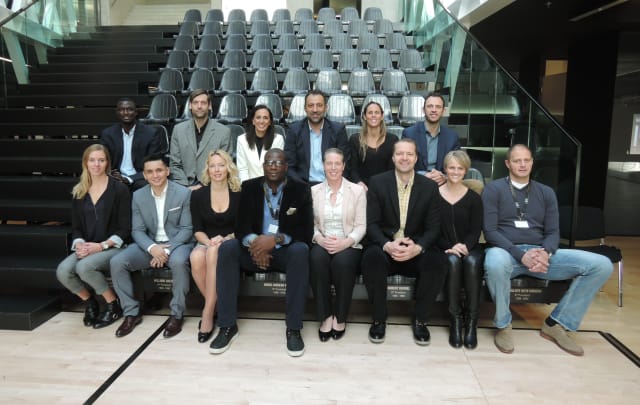TIME-OUT will get players ready for life after game
REGENSBURG (David Hein's on the Future) - Imagine getting a university degree and not using it for 10-12 years or so. When you finally are ready to get some use of your education, it is out-dated and you
REGENSBURG (David Hein's on the Future) - Imagine getting a university degree and not using it for 10-12 years or so. When you finally are ready to get some use of your education, it is out-dated and you are unaware of the latest developments in the field.
Welcome to the life of many veteran basketball players when they are going through the decision about what to do when they retire.
FIBA Europe and the European Union want to change that and have developed the TIME-OUT Project, which is a 14-month programme designed at preparing basketball players for careers following their active playing days.
"This is an extremely exciting project to be involved in. Planning a career, post-professional sport, is a major issue across all sports, and it is important that with this project we, along with the European Union, are acknowledging the issue and taking one of the necessary steps to address it." - Kamil Novak
This sounds like a fantastic project and players nearing their retirement would be greatly served to get a spot in this programme, which will likely all but set them up for great success after they've played their final game.
Let's start with the foundation of the project.
FIBA Europe had been receiving questions and requests from veteran players about what kinds of careers they could enter within basketball when they hung up their sneakers. At the same time, the European Union expressed as a goal to assist sportspeople in dual careers, meaning they wanted to ensure that athletes receive an education and/or professional training alongside their sports training.
FIBA Europe stepped up and designed the TIME-OUT Project with funding from the Erasums+ Sport section of the European Commission to cover the costs of an outstanding educational opportunity for players selected. FIBA Europe brought on board the Newcastle Business School, which is part of the Northumbria University in Newcastle and considered one of the best business learning institutions in Europe. The University of Physical Education in Budapest is also part of the project as its main research institution while the Talent Athlete Scholarship Scheme (TASS) in England will assist the athletes in balancing academic life and professional competition.
"This is an extremely exciting project to be involved in," FIBA Executive Director Europe Kamil Novak said. "Planning a career, post-professional sport, is a major issue across all sports, and it is important that with this project we, along with the European Union, are acknowledging the issue and taking one of the necessary steps to address it."
FIBA Europe aims to work with players with clear leadership potential and the view of becoming basketball ambassadors if you will in their country.
This programme will undoubtedly produce a group of well-trained, well-educated leaders who could accomplish great things in the game of basketball. It would not be a surprise at all if graduates of the project end up being leading professionals, up-and-coming general managers, heads of national basketball federations and eventually guiding figures in the direction of the game in the future.
 Elisabeth Cebrian (No. 14 Spain) is project manager of the TIME-OUT Project.
Elisabeth Cebrian (No. 14 Spain) is project manager of the TIME-OUT Project.
The project is being managed by two former players in 1988 Olympian and two-time FIBA Basketball World Championship for Women participant Radmila Turner (Vassileva) of Bulgaria and Spanish two-time Olympian, three-time World Championship for Women competitor and 1993 European champion Elisabeth Cebrian. Turner is the project supervisor while Cebrian serves as the project manager.
So, who is even eligible to participate.
The target group is active or recently retired players over 30 years of age who were top national league players in their country or national team players. The players must have the minimum of a high school diploma, possess excellent written and oral English language skills and be highly motivated to complete all the course work and attend the workshops.
FIBA Europe has contacted 50 of its national federations and asked them to nominate two players - one male and one female - to take part in the project. FIBA Europe expects to have 80 players - 40 men and 40 women - in the program but can accommodate 100 if all 50 federations nominate one player of each gender. Nomination runs until the end of 2016.
Interviews will be conducted with the candidates and the final list will be announced in March 2017. The project will be officially launched during FIBA EuroBasket Women 2017 in June 2017, when the first workshop will also take place.
Online educational work begins in July with a second workshop to follow in June 2018 and the final workshop, assessment and graduation ceremony to take place at the end of August 2018.
Because of course work and workshops in the summer, candidate players cannot be active national team members.
 The FIBA Players Commission is one place former players can help the next generation of players.
The FIBA Players Commission is one place former players can help the next generation of players.
Some players who have recently retired and already moved into leadership positions off the court include Spain great Amaya Valdemoro, who retired in 2013 and now serves on the FIBA Players Commission and will be a member of the TIME-OUT Project Advisory Board; former stars Andrey Kirilenko and Hedo Turkoglu, who both retired in 2015 and are now president of the Russian Basketball Federation and the Turkish Basketball Federation, respectively. Another such player is Belgian big man Tomas Van Den Spiegel, who was named to the FIBA Players Commission as well as becoming the president of the Union of European Leagues of Basketball (ULEB) since retiring in 2012.
Graduates of the TIME-OUT Project could certainly go down a similar path, and the whole basketball family will be better off because of it.
David Hein
FIBA
FIBA's columnists write on a wide range of topics relating to basketball that are of interest to them. The opinions they express are their own and in no way reflect those of FIBA.
FIBA takes no responsibility and gives no guarantees, warranties or representations, implied or otherwise, for the content or accuracy of the content and opinion expressed in the above article.